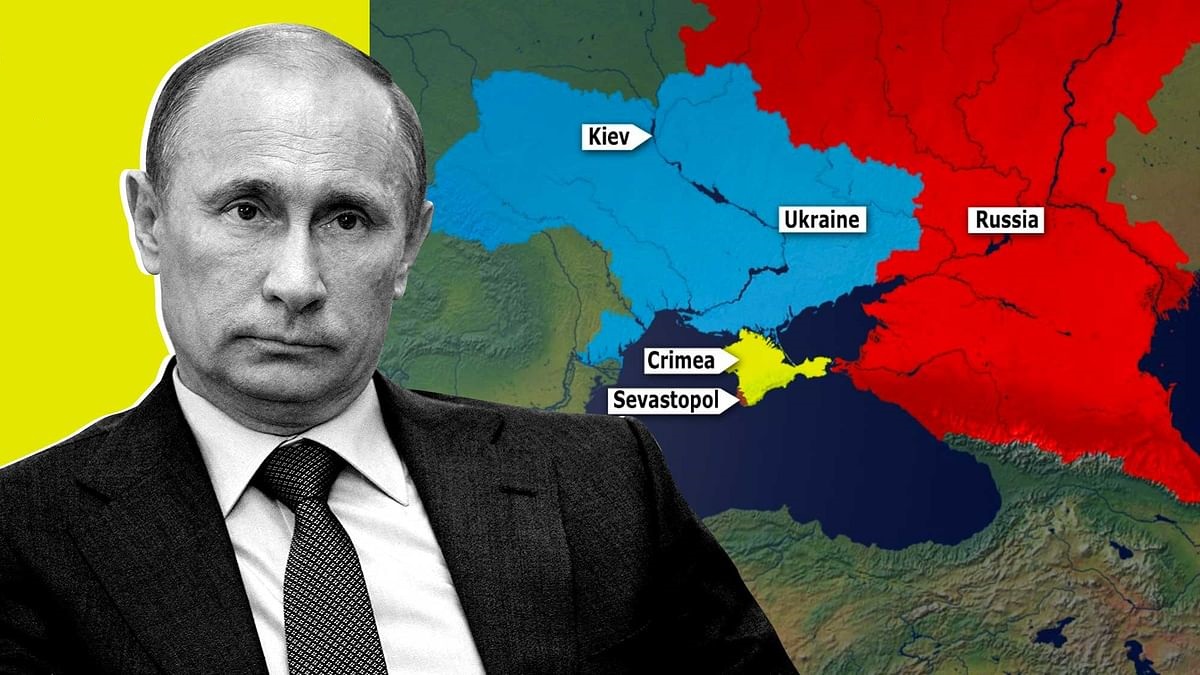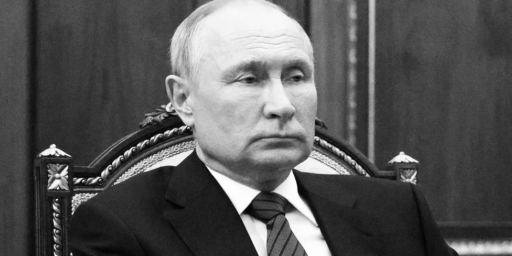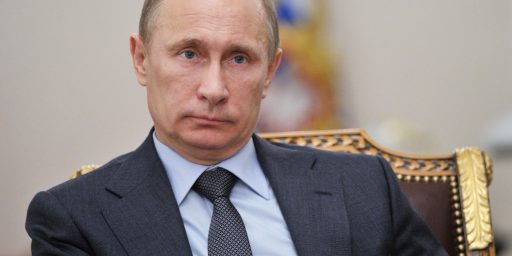Is Putin Predictably Irrational?
Putin is a monster, but he may also be just as irrational as the rest of us.

In the last several days, commenters here and in countless other places have spilled a lot of electronic ink over the topic of Putin’s rationality. Is he a madman? Was he not in control of his faculties when he ordered the invasion of Ukraine? How could he have approved of an invasion plan as militarily flawed as it was? Is he now incapable of making rational decisions, making an already dangerous crisis even worse?
As Steven Taylor pointed out, we shouldn’t conflate irrationality with anything that makes us horrified or baffled, such as brutality, a foreign mindset, naked corruption, or many other unpleasant traits of Putin. But, by some more accurate meaning of the term rational actor, is Putin behaving irrationally?
Yes, to the extent that we are all much less rational than the highly efficient cognitive machines that we fancy ourselves to be. Our brains are not perfect computers. They’re wired to see patterns, sometimes implying things that aren’t really there (giant carved faces on the surface of Mars, sinister conspiracies operating behind the facade of everyday life). Our brains also lead us to make decisions that are sub-optimal, or just plain bad.
Fear of loss may derange us
In the 1970s, two economists, Amos Taversky and Daniel Kahneman, discovered that by framing the same economic decision differently, people made very different choices. Even when the expected outcome was the same, the perception of whether you are winning or losing changes your behavior.
In the first experiment, participants were told they started with $1,000. They could either (a) get $500 more dollars outright, or (b) take a 50/50 chance of either getting another $1,000, or getting nothing. The majority of people chose (a), the sure thing.
In the second experiment, participants started with $2,000. Their choices were (a) lose $500, or (b) take a 50/50 chance of either losing $1,000, or losing nothing. The majority chose (b), taking the risk, even with a substantial probability of coming out worse.
In both scenarios, the outcomes, and the probabilities of achieving them, were the same. Nevertheless, the fear of loss led to riskier behavior.
Vladimir Putin, of course, sees loss everywhere. The Soviet Union collapsed in 1991. Both former components of the USSR and Warsaw Pact countries (the Baltic States, Poland, Hungary, etc.) joined the West economically, militarily, and politically. Other newly independent states, such as Ukraine, continued to slide in that direction. Even with the economic clout that oil and gas production gave Russia, and the menace that its nuclear arsenal continued to present, modern Russia had nowhere near the power, both hard and soft, that the Soviet Union once enjoyed. Without some drastic action, the situation would only get worse.
For someone who had already experienced loss, and faced even more of it, positive incentives such as economic integration with the West and security guarantees from NATO might not have the appeal as we might assume. These offers might look, from Putin’s standpoint, like the “lose $500” option, not “gain $500.” If that is his framing of the situation, to Taversky and Kahneman’s term, then he was more likely to take the risky gambit.
We see what we want to see
One of the most familiar terms from modern social science is confirmation bias. If we have a pre-existing or preferred conclusion, we tailor the facts to fit it, instead of cooly re-assessing our opinions in light of contradictory evidence. If we believe that witches are real, but no one has evidence of any suspected witch casting a hex, then that just goes to show you how devious witches are.
Similarly, if you are hell-bent on restoring the former Russian or Soviet empire in some fashion, you’re likely to look for signs that it’s a desirable and attainable objective. He’s not the first leader in the 21st century to want to believe that people whose country he was invading would welcome the invaders. He’s also not the first to overestimate the power of “shock and awe” to lead to a quick victory, especially if you underestimate the enemy. When their genius strategies unravel, leaders are unlikely to question whether they were as brilliant as originally thought. Instead, they insist on their intensification, since the problem in their minds is clearly that their strategies haven’t been pursued strenuously enough. That preference for escalation over reconsideration is as true of Putin in Ukraine as it was with Lyndon Johnson in the strategic bombing of North Vietnam, or “Bomber Harris” in WWII. (For a good discussion of these phenomena, see Fred Ikle’s Every War Must End.)
Even if you’re not an increasingly isolated autocrat, confirmation bias is a genuine risk. John F. Kennedy arguably fell victim to it early in his presidency, during the Bay of Pigs fiasco. He wanted to believe what his advisors, heavily invested in the invasion plans, were assuring him would happen: with a little push, the Communist regime in Cuba would collapse. Later, he took steps to prevent this sort of chummy consensus, which led to his more capable handling of the Cuban Missile Crisis. Confirmation bias always lurks right around the corner, whether the source of it is our own isolation, or the “groupthink” that metastasizes among like-minded people.
Garbage in, even stinkier garbage out
If we think that the acme of rationality is making optimal choices, then we’re talking about an outcome that depends on two factors, cognition and information. As we’ve discussed, even in the best of circumstances, cognition isn’t perfect. It’s even less reliable when you’re tired, you’re constantly anxious about threats to your person, and you’re under other stresses that may apply to Putin. (If sanctions have done grievous financial injury to him, that may contribute to even a worse state of mind. That’s not an argument against sanctions, just a statement of possible fact.)
We can’t say anything certain about the quality of information that Putin has. A dictator’s brain may be unwilling to admit uncomfortable information. A dictator’s advisors may be just as hesitant. Certainly his cringe-worthy grilling of his advisors on television implies that he may not be getting the frankest assessments of the situation in Ukraine. If so, that makes his ability to make cool, unbiased choices among options even weaker.
Putin’s brain makes the world a scary place
The real risk right now isn’t that Putin is irrational, in the sense of someone who is so mentally impaired that he makes random, destructive choices. Instead, we should be very concerned that he has a particular frame of mind that leads to highly risky choices, steered by an unassailable worldview that makes perfect sense to him (only the most brutal emerge victorious), based on information that is either unreliable in the first place, or prone to dismissal when it is uncomfortably accurate. As his recent call with French President Macron shows, he is defending his assumptions, arguments, and actions vigorously. It will be very hard for him to step down from them, admitting that he was wrong all along, leading to a massively greater sense of loss. In that sense, Putin is perhaps understandably human, and also terrifying. The wholesale destruction of Ukrainian cities seems entirely thinkable. Even the use of nuclear weapons may not be as unthinkable as it once was.





I’ve been thinking about this a lot over the last week. Putin was in his mid-30s when the Berlin Wall fell, something that has been said to have been a formative experience for him. I have no doubt that at that point in time, he was assessing information as it came to him.
As he has accrued more power, brutally, I suspect that he’s either not being presented with all intelligence, or he’s not viewing it objectively.
People default to what’s worked for them in the past. Putin has always been brutal and it’s worked for him.
Fiona Hill maintains that, just as we don’t understand Putin, he doesn’t understand us, meaning western society:
http://www.thebulletin.org/premium/2022-02/putin-the-one-man-show-the-west-doesnt-understand/
Excellent post.
And if it helps anyone understand where I was coming from in my post, I don’t disagree with this one and it fits within the parameters of argument/assessment.
@Jen: I’m roughly the same age and could be described as “mid thirties” when the Berlin Wall fell. It was a signal event for me, certainly. It could hardly avoid being such for someone in the employ of the Soviet Government, as he was.
Still, you can take those feelings in multiple directions, but this direction is a very recognizable one.
Honestly, I just read a piece on how Zelensky, being a Jew, and sort of an outsider, suddenly seemed very relatable to so many Ukrainians. I expect a similar thing with Putin’s resentment of their loss resonates with many Russians. Although maybe not so many of them endorse outright conquest of an unwilling sovereign.
@Jen:
Both, I suspect. Fiona Hill says Putin doesn’t really understand western society or thinking.
@CSK: I feel I have at least a framework of understanding of Putin. I did a “soft” martial art – ju jitsu – for over 20 years. Putin reminds me of the sort of person, almost always male, who comes in with a much more “hard” martial arts orientation.
Of course, they’ve come to you, so there’s some willingness to learn and change already evident. And yet, they have a very hard time putting aside their habits and commitment to “going all out”. (We go all out in “soft” martial arts, it just looks very different). A lot of what they do is driven by fears, and yes, they often explore contingencies. You try to teach them a technique and they are full of “what ifs”, even though the technique is really just a building block.
One of the necessary things in helping these people on their journey is to thoroughly dominate them on the mat, and yet never injure them or let any of this sort of conflict bleed to dealings with them off the mat. Maintaining that high contrast is valuable.
I don’t know that this can be directly applied to Putin. He isn’t looking to change. He doesn’t really care about having a relationship with us. But it’s not just Putin we are addressing with our actions, it’s all the Russians – political support matters even in Russia. I think what is going on right now is a good course, but the other thing to remember is that you don’t control other people’s decision making process. It’s up to them to decide when and if they want to do things differently.
Overall, people shouldn’t take their delusions too seriously.
I quite agree with all this, but would add one thing:
Long ago I was compelled to take a series of anger management classes. The main reason really wasn’t the fights I got into, it was mostly that a display of rage, coming from someone my size, scared people. The judge even told me so.
There was a solid gold lesson in those, for me, that hatred is just a mask for fear. I found that somewhere in the process figuring out what the heck I was afraid of, of assessing actual ability, motivations and his perspectives, my enemy transformed from a monster into a human being. I also found out that if worse still came to worse it did not affect my ability to fight effectively. There was no need to for berserker adrenalin, in fact I came to view that a “clutter”. I fought better cold.
When we call Putin a monster it makes me cringe reflexively. I understand the nice warm feeling it gives but…if we really think him a monster what’s left but to warm up the nukes?
We too have BSed ourselves, and not all that long ago, into invading another country. We have destroyed whole cities as an example so we didn’t have to destroy the whole country of Japan.
@CSK: That was sort of alluded to in the BBC piece I linked to. He seemed fascinated by what “western behavior” could GET for him, e.g., money, without really understanding the why of Western thinking.
He never would have made it as a GRU officer.
Seeming irrationality may be a ploy. Nixon formulated the theory that he needed to present himself as a madman in order to complicate the opponents’ calculations. If you presume that Putin is 100% rational than there are a limited number of options for him in any circumstance, but if you that he is irrational then you must consider a much larger number of possible responses. Putin recently put his nuclear forces on high alert. No sane, rational reason for the use of nuclear weapons exist, but no one opposing Putin can totally dismiss this action. The West’s support of Ukraine is hampered by having to calculate that, yes, Putin might do something crazy in response. Our side needs to always think that Putin is saying what he means or saying the direct opposite of what he means or some mix of the two.
I used to be irrational, but now I’m just craayzee!
@CSK:
Heard on BBC Radio: report that Russian financial experts tried to tell Putin that his vaunted $643 billion currency reserves were not the thing he thought.
He just dismissed it.
They were attempting to explain that about 60% of those “reserves” were merely figures in the electronic ledges of Western banks.
And that if they locked the accounts the money was useless.
The rest is physical gold, some actual cash and bearer bonds, and a pile of renminbi which is probably out of use as well, given the attitudes of Chinese banks.
Oopsie.
This is a great article. And while I don’t think that it ever explicitly said it, it points out that, people aren’t rational/irrational, decisions are.
@JohnSF:
Putin seems to hear what he wants to hear. Sounds a bit like Trump.
@CSK:
This! Smarter, but still not as smart as he fancies himself. But similar, Trump is his mini-me.
Probably even more surrounded by yes men who know it’s safer not to tell him anything unwelcome, and likewise getting his information from propaganda sources.
@charon:
It seems to be a defining trait of authoritarians that they surround themselves only with yes men.
@JohnSF: mmm Putin’s miscalculation is not it should be the “mere entries on ledgers” nature, as physical gold etc on reserve in Western central banks would be equally inaccessible (without bothering to check Russian, Bielorussian, but abstractly historically lots of gold has been kept in NY, London for convenience reasons). His enormous miscalculation was that Western reaction wouldn’t touch such reserves of whatever nature.
Not a bad calculation had he exectured what many thought – a limited invasion focused on the East. But for what he did execute, enormous miscalculation. They should have by day 2 when it became clear the phony-war blitzkreig wasn’t working started transferring reserves like mad.
And as one has to suspect the full invasion was not a last minute change, they really should have – as per the advisors – started moving their reserves out of Western countries into refuges. China I suppose, India. Not particularly brilliant options, but…